Something I noticed recently when looking for motorcycle parts for my Honda 919 (a.k.a. the Hornet 900) is that Facebook marketplace has become rife with scams of a new and very specific variety — motorcycle parts and car parts.
I presume this exists in other industries, too. But it just surprised me how specific this kind of scam is, because they go down to the model number and part, indicating that the scammer might have some deep knowledge of motorcycles. And it surprised me how they’ve exploded in number over the last six months or so.
I first came across this through my own experience, but since then I’ve learned a lot from two resources: 1. the Auto and Motorcycle parts Scams Facebook group, which attempts to expose as many as possible, and 2. the Scambait subreddit, where people enjoy toying with scammers with ridiculous conversations (it can be highly entertaining, like this one… enjoy!).
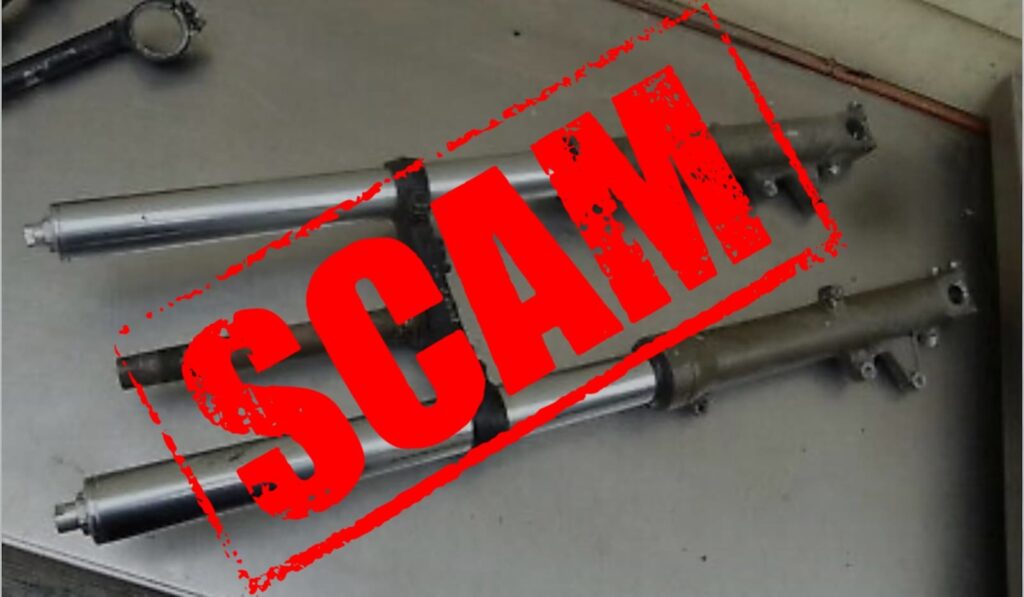
I’m no rube when it comes to the internet. I often joke that I “basically invented the Internet” because I was using it on dial-up in the early nineties (before the web!) and did a degree majoring in telecommunications engineering, focusing on security (learning literally how to hack and thus prevent hacks).
But still, time moves on and the world keeps turning. It would be foolish to assume I’m immune to scams and that I always will be — kind of like assuming cars only pull out in front of other people. Hacks and scams aren’t just technical; they’re often social engineering — they rely on tricking a human being into believing that something is legit.
On top of this, I’m aware that the motorcycling population is an ageing demographic. Even I’m getting older — on a daily basis! Now, without prejudice or judgment, older folk tend to be statistically more susceptible to scams. So I’m putting this up as a helpful guide in case it helps you avoid losing a few hundred bucks.
Are you obsessed with motorcycles?
Well, I am. That’s why I created this site — as an outlet. I love learning and sharing what others might find useful. If you like what you read here, and you’re a fraction as obsessed as I am, you might like to know when I’ve published more. (Check the latest for an idea of what you’ll see.)
What Motorcycle Parts Scams Look Like
The first time I noticed a motorcycle parts scam was when I made a post in a few groups looking for a pair of forks for a Honda CBR600F4i (to put on my 919).
Very quickly, a few people responded that they did. They told me to go look at some specific pages.
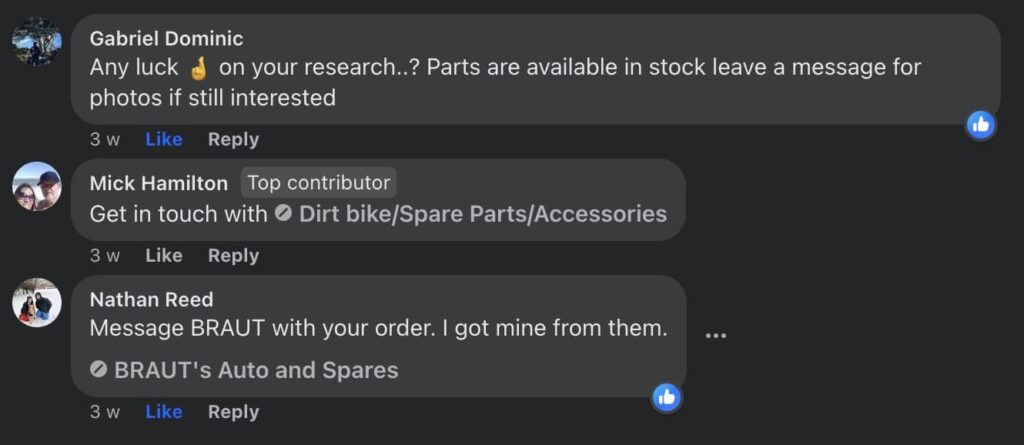
In this case, two of the links were to pages. But one was a person.
Look, my alarm bells went off at how quickly they responded. I didn’t know what these scams were, so I did message them. One told me they had the parts I was looking for and sent me some pics — just one, low-resolution pic. Then they gave me a price (which was reasonable — not too high, not too low) and asked me for payment so they could ship it.
Now, I have bought things online before (I bought my Hayabusa sight unseen from another city — and it even had a loan outstanding, but it all went well!), but generally I verify that people online are a real person first by looking through their profile, looking at a piece of ID that matches their profile name, and then talking to them on the phone, preferably a video call.
So — I asked to do those in this situation. In this case, every red flag was present. There was no person’s name. The person offered no way of authenticating that they’re a real person, and didn’t want to talk on the phone — said to just contact them through the page. And of course, they started insisting on payment pretty early.
Note that there were a few things that I could see would be tricky for some users. The page from which they post has lots of “likes” — which make a profile look legit. But you can basically buy likes (through advertising) and they’re very cheap, especially if you advertise in low-income countries.
There are plenty of other ways in which scammers fish for leads and wear a mask of superficial legitimacy.
- In motorcycle parts / for sale groups, they’ll post parts for specific bikes, or post a pic of a bike and say they’re parting it out.
- Random people will chime in and say “I’ve bought from this page and they’re great.”
- Their Facebook page will have lots of motorcycle-related photos and memes, but with poor or no descriptions. Still, at first blush, this looks legitimate.
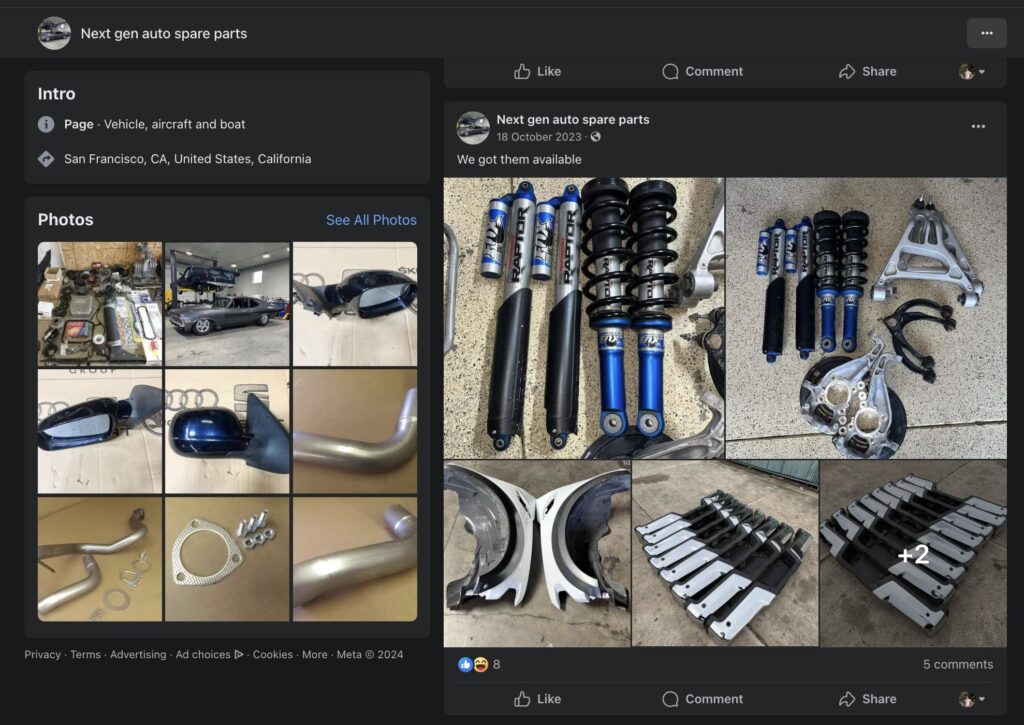
- Scammers’ profile photos will look like what you expect a parts salesperson to look like — usually an older white man, a bit rough looking.
Basically, scammers are quite well-practised at seeming legitimate.
Identifying Motorcycle / Car Parts Scammers
If you suspect a person online is not legitimate, below are a few tips and tricks I’ve learned to identify who’s a scammer and who isn’t. This isn’t an exhaustive list, and also, scammers might pass some of these tests.
- Limited history. Scammers have fairly recent profiles. Even a couple of years old is suspicious — how old is your Facebook account?
- Odd name. For some reason, a lot of scammers have names that sound kind of normal but not quite right, like two first names (“Chris Phillip”, “John Patrick”).
- A name that doesn’t match up with their user URL.

- Typos/weird syntax in the group or profile name. Strange capitalisation or spaces, or incorrect use of plurals. I’m not trying to be picky over spelling, but if it’s your legit business, you’ll name it “Harley-Davidson Parts and Spares”, not “Harley davidson part’s And spare”.
- Fake location. Lots of friends or addresses in a place that doesn’t match where they say they’re from. Scammers will say they’re nearby, usually in a remote part of your country (so you will request postage). But you can go through their friends and look for a bunch of names that sound foreign, or go to their profiles and see that they’re from some remote place in Africa or Asia.
Think about this for a second — how does a parts business operate in the middle of nowhere? Legit parts businesses always operate in industrial parts of major cities. That way they can get supply, shipments, and so on. I mean, I’m sure this does happen, but the businesses would be small, serving the local community and not having enough parts to sell all over the country.
Also, I don’t mean this as a race thing. I have a non-white name, so I don’t want people judging me purely on my name or personality. That’s not fair. It’s the whole picture that has to not add up. If someone says they’re from Yeppoon, Queensland, and all their Facebook friends are from Burkina Faso, then you’d be right to consider it a red flag.
- Strange writing style. They’ll write with a style you come to know as being from lower socio-economic classes of various other parts of the world. I’m by no means castigating non-English speakers — English is my second language — but I’m just saying that there’s a stylistic red flag that you come to recognise. E.g. starting sentences with “Am” or even using obviously ChatGPT-generated sentences that are very general in nature.
- No verification. Scammers will never give you any way of verifying they’re real. There’ll be no website, no business license, no phone call.
- Lousy photos of the product. A scammer will only give one or two photos, and can’t produce more photos — because they’re copied from somewhere else on the internet.
If you have free time and feel like it, you can do a reverse image search on photos. But this isn’t a foolproof method — the photos might have come from private groups. But see below — one photo I was sent was a photo of the same product on eBay. The scammer cropped it slightly.
- Agreeing to a lower price quickly. Scammers always accept a lower offer. I’m not a master negotiator by any means (which is why I respect people who are), but if someone asks for a discount, I don’t just give them one because they sound nice.
- Insisting on up-front payment. This is a huge red flag. The thing is, legit individuals also often ask for this, and I’ve done it (a few times) without consequence. But when they over-insist with all the other red flags, it’s a red flag on its own.
Despite all this, I sometimes get it wrong. I went absolutely off on someone on eBay for being a scammer before I realised they weren’t a scammer — they were just stupid and didn’t understand the platform (which I also went off on them for as it cost me money). But I don’t feel bad for being cautious.
More Resources
If you’re wondering if you’re being scammed, the first thing is to ask. Ask friends and family (don’t be shy), ask forums, or even ask me — drop a comment or use the “contact me” link (I’ll try to respond quickly if it’s a brief message). Always happy to help.
Do a search in the Auto and Motorcycle parts Scams Facebook group, which might give you some hints.
And when in doubt, if it sounds too good to be true and there are too many red flags for your comfort — don’t do it.

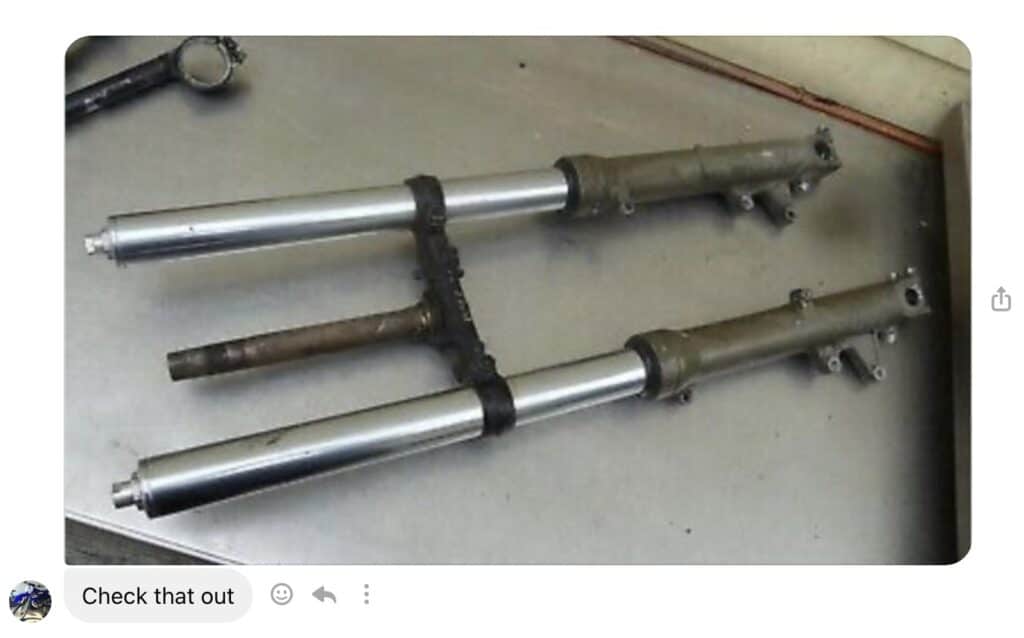
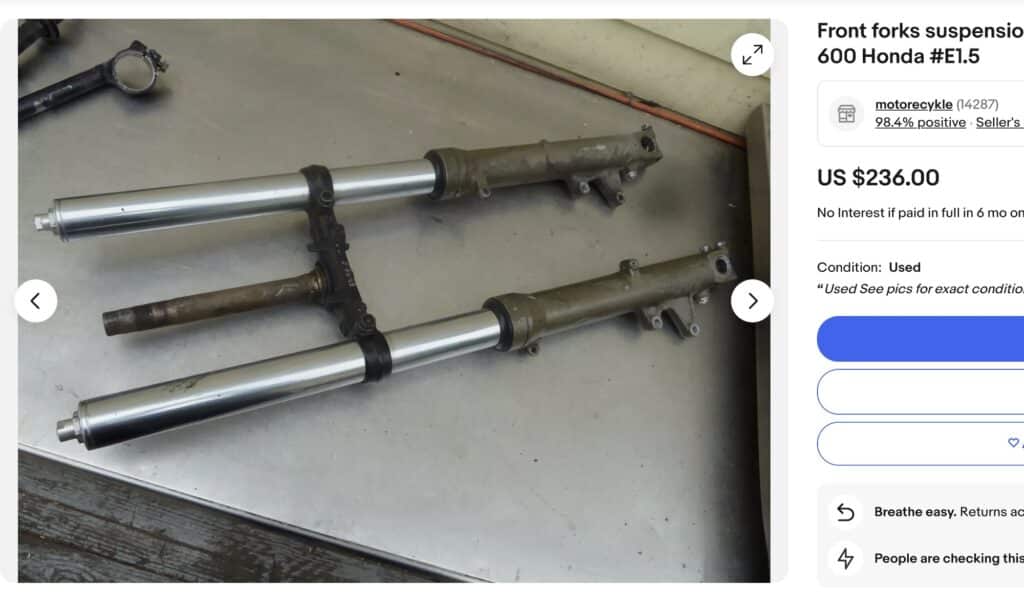
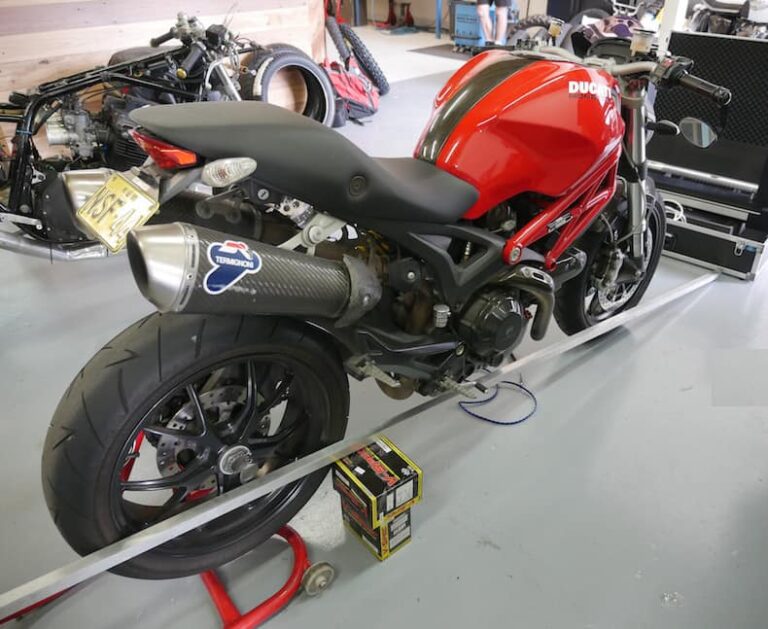
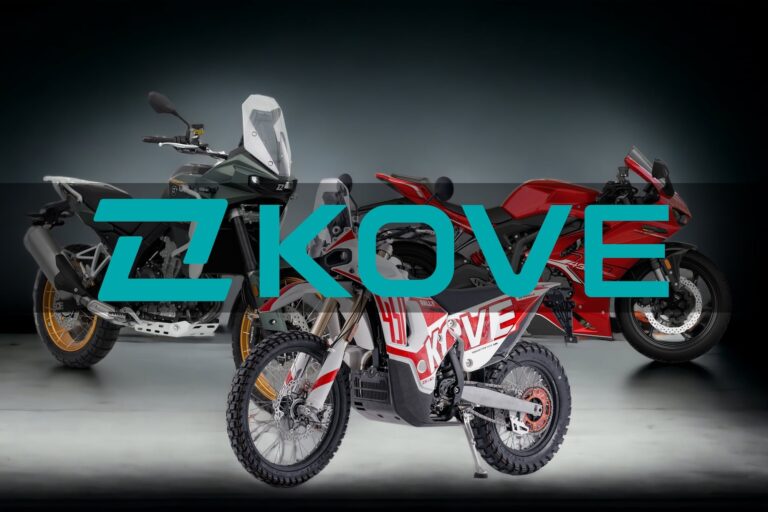

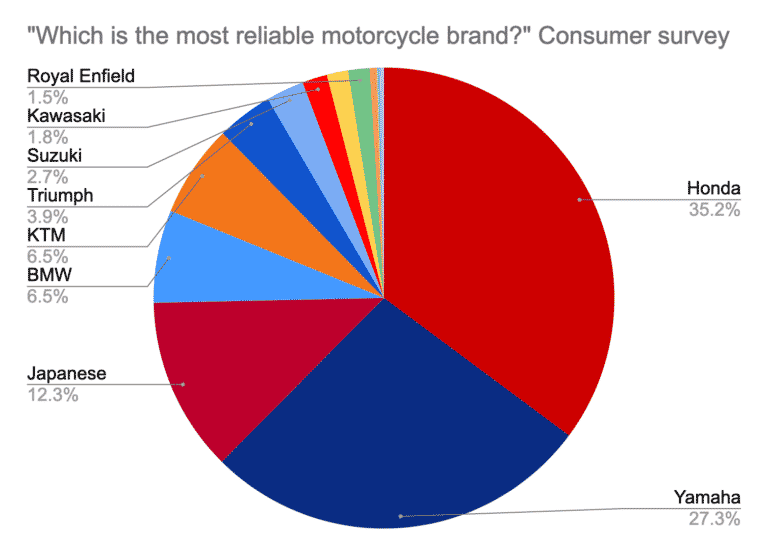

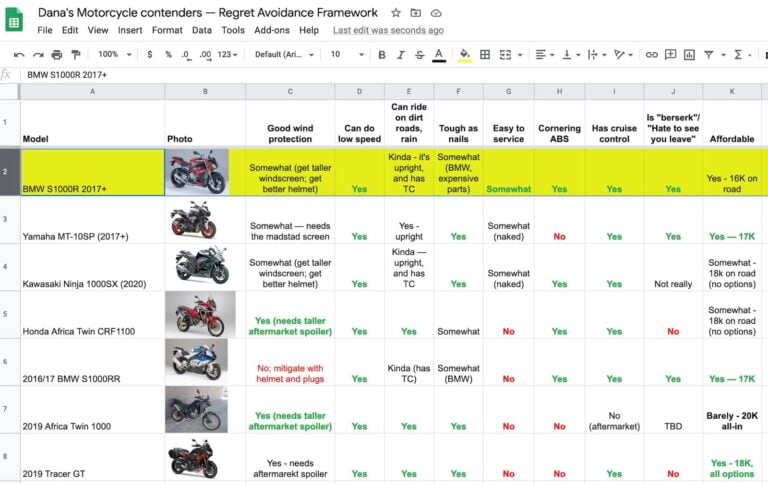
Better stick with legitimate groups like BMWMOA or TriumphTalk to find parts. I got scammed once on eBay buying handle risers. Now it’s either the dealership or known dealer like Motone or user groups, not Fakebook or Tweetie.
Very true — especially the groups where they make it hard to post (e.g. you must have posted 10-20 times elsewhere first). Still, I’d assume there could be red flags on those sites, too, especially as those sites are getting popular again.
Thanks for taking time to put this message out there Dana. I’m a senior rider and must admit I had not heard of this type of scam. Best to put the ego aside and be forewarned…
You’re welcome!
It’s just as bad selling as it is buying. FB is too much hassle and risk to be worth it most of the time. eBay is a lot more reliable. The other problem with FB is that there are so many flakes. More of them than legit buyers. I use FB for large bulky items that are too expensive too ship, like the set of snow tires and rims I just sold. I’ve sold approximately 400 household liquidation items on eBay in the last six months with five total issues. When told they would be reimbursed in full, including shipping, once I had received the item two of them shipped it back and the scanners weren’t heard from again.
I started seeing that weird language on several Camaro sites I’m on a few years ago when I got a Camaro. One tip is they don’t understand what’s wrong with spelling Camaro Camero.
Selling is so difficult, yeah. Seems like you know your way around eBay at least! Wish I knew your ways! A guy just flat out refused to pay for my laptop he won because he didn’t have the money. No impact on him, but wastes my time.
Great article. Thanks for keeping the community informed and alert!
Dana, Thank you so much for writing this (and notify your followers by email). Just pure quality, great writing skills, well done mate! I feel a lot more educated now 😉
Cheers,
Adrien
Thanks, I’m really chuffed by your kind words, I’ll work to keep making things like this.
I saw the same ad for a guy parting out a gen 5 VFR on two different VFR groups. First , who ever heard of a gen 5 blowing up and second he says to use PayPal but the personal options ( no refunds if you pay that way)and even though this time he is pretending to be in Australia the PayPal convention is to US dollars. Plus his profile pic has him in on a Goldwing with the sidecar on the wrong side for Australia and in the snow! Oh and the front guard , no pictures , is in perfect condition and didn’t need paint.
He had a weird name and a different PayPal name.
Yep, so many red flags!
There is a huge global market for fake airplane parts, fyi. Tons of scammers also responding to motorcycle ads as well, people saying that they will send you a check and have the bike shipped to them.